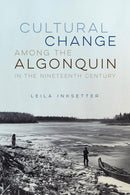Description
Written by Leila Inksetter and Bruce Inksetter. Leila Inksetter is professor in the Department of History at the Université du Québec à Montréal. Bruce Inksetter (1938–2023) had a long career as a translator, contributing to several academic publications.
The nineteenth century was a time of upheaval for the Algonquin people. As they came into more sustained contact with fur traders, missionaries, settlers, and other outside agents, their ways of life were disrupted and forever changed. Yet the Algonquin were not entirely without control over the cultural change that confronted them in this period. Where the opportunity arose, they adapted by making decisions and choices according to their own interests.
Cultural Change among the Algonquin in the Nineteenth Century traces the history of settler-Indigenous encounter in two areas around the modern Ontario-Quebec border, in the period after colonial incursion but before the full effects of the Indian Act of 1876 were felt. While Lake Timiskaming was the site of commercial logging operations beginning in the 1830s, the Lake Abitibi region had much less contact with outsiders until the early twentieth century. These different timelines permit comparison of social and cultural change among Indigenous peoples of these two regions. Drawing on nineteenth-century archival sources and twentieth-century ethnographic accounts, Leila Inksetter sheds new light on band formation and governance, the introduction of elected chiefs, food provisioning, environmental changes, and the interaction between Indigenous spirituality and Catholicism.
Cultural change among the nineteenth-century Algonquin was experienced not only as an uninvited imposition from outside but as a dynamic response to new circumstances by Indigenous people themselves. Inksetter makes a case for greater recognition of Algonquin agency and decision making in this period before the implementation of the Indian Act.
Review by David T. McNab FRSC, Métis historian, “Providing major and original insight into the ethnohistory of Quebec, Inksetter’s book is well documented and exceedingly well researched and written.” David McNab, York University".
This book contains 27 photos, 8 tables.


